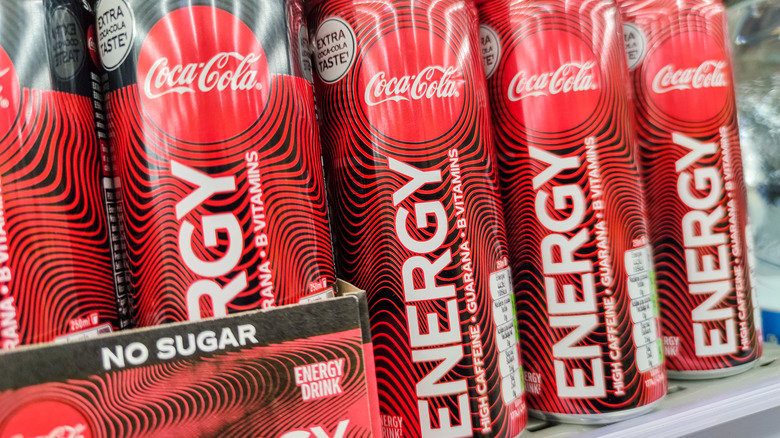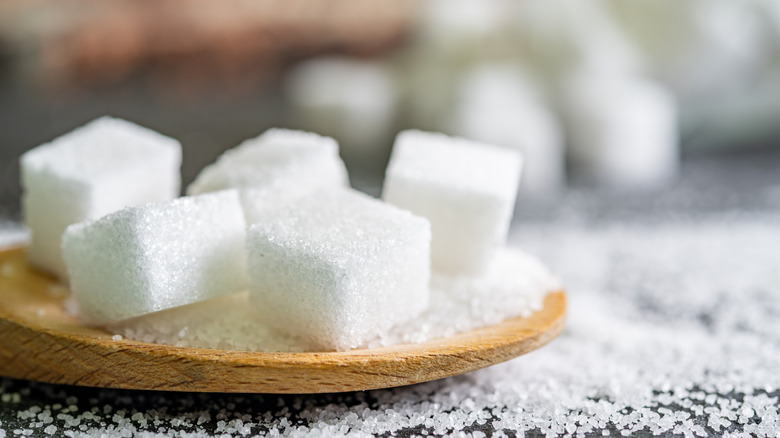Why Energy Drinks Could Be Making You Tired
Who hasn't reached for an extra cup of caffeine or even just wished for a spontaneous boost of energy? From vitamin-infused cans of fizzy pop to small containers of concentrated energy shots, the energy drink is one of the most popular dietary supplements in the United States (per Proper Wild). In fact, energy drinks come in second only to multivitamins as the most consumed dietary enhancement. People are clearly searching for added energy, but what happens when the products marketed to give you energy actually end up making you feel more tired than you were to begin with?
The National Center for Complementary and Integrative Health (NCCIH) reports that approximately one-third of teenagers consume energy drinks on a regular basis, while men ages 18 to 34 years old are the biggest customers of the products. Their appeal is most likely the promise of energy, but even though many products are sold as health supplements or performance enhancers, the ingredients within energy enhancement products can have detrimental effects on your health and energy levels, particularly caffeine and added sugars. NCCIH also cautions that energy drinks can be dangerous, even resulting in hospitalizations, so it's important to be judicious about what you put in your body. Think of it as a double-edged sword, with caffeine and sugar giving you a boost but also being the reason you probably feel sluggish a few hours after downing an energy product.
Be cautious with caffeine
It seems almost a given that most energy drinks contain caffeine, but what may be surprising is how many of the various ingredients increase the amount of caffeine in any given energy product. Guarana is a common ingredient in energy drinks that has one of the highest natural caffeine contents, up to 5.8% by weight, according to WebMD. To put that amount of caffeine into perspective, coffee has approximately 2% caffeine by weight. You should also know that guarana hasn't been extensively studied by experts and that there isn't any maximum recommended dose, so be aware of how much guarana is included in your diet. Mayo Clinic states that adults should have no more than 400 milligrams of caffeine per day, no matter the source.
Since caffeine tolerance can build up over time, regularly consuming energy supplements with high amounts of caffeine can ultimately backfire on your stimulation levels (per Proper Wild). Caffeine's stimulant properties come from its obstruction of a naturally occurring chemical called adenosine, which helps to induce sleep. Thus, caffeine can keep you awake, but at a price. The flipside to this is that as you consume more caffeine, your body will try to create more adenosine to help you get the rest you need, eventually resulting in feelings of tiredness and lethargy after having an energy drink.
Sugar can have serious consequences
Sugar is also a potential culprit for eventual tiredness after consuming energy drinks. You've probably heard about kids having too much sugar and then experiencing a sugar crash, but did you know that adults can have sugar crashes, too? When you quickly consume a lot of sugar, the insulin levels within your body rapidly rise and give you a boost of energy, but the follow-up can be a steep decline in insulin levels that can leave you feeling tired all over again (via Healthfully). A burst of sugar can give you a streak of energy, but the comedown can be filled with fatigue.
And that's not the only reason to be wary of sugar. Energy supplements often have added sugars, both natural and artificial, which can result in weight gain, alongside more serious health conditions like heart disease and diabetes, per the Harvard T.H. Chan School of Public Health. There are 40 grams of sugar on average in an energy drink, and despite being marketed for athletic performance and enhanced alertness, energy products often have the same sugar content as soda and other sugary beverages. In comparison, the American Heart Association (AHA) recommends a daily maximum of 36 grams of added sugars for men and 25 grams for women. Perhaps not surprisingly, the AHA notes that sugary drinks and beverages make up nearly half of the added sugars consumed by Americans, so it's important to be mindful of the amount of sugar you consume.



